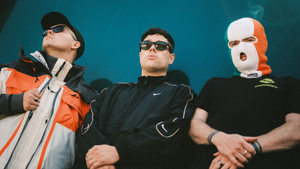The UK’s Crown Prosecution Service is appealing the recent ruling dismissing the criminal case against Kneecap’s Mo Chara, who was charged with a terror offence over allegations he displayed a Hezbollah flag at a London gig last year. The rap trio say the appeal is “unsurprising”, but also “a massive waste of taxpayers’ money, of police time, of court time”.
Ever since Mo Chara was charged earlier this year, Kneecap have claimed that the criminal case has been pursued against them because of pressure from pro-Israel political groups who want to silence the band’s on-stage support for Palestine.
They repeated that allegation in their latest statement, arguing that the CPS appealing last month’s ruling is “unsurprising” because “this whole process has not been driven by the police or the courts, it has been driven by politicians backed up by British media - this is political policing”.
The case against Mo Chara was dismissed after the magistrate considering the case concluded that prosecutors had made procedural errors when charging the rapper, principally missing a deadline to get approval from the UK Attorney General to pursue the case under anti-terrorism laws.
The Kneecap gig where the Hezbollah flag was allegedly displayed - possibly in violation of rules that prohibit expressing public support for proscribed terrorist organisations - took place on 21 Nov last year. Under the relevant laws, Mo Chara had to be charged within six months of the incident, which he was, on 21 May this year.
However, Kneecap’s lawyers argued that Attorney General approval was required before any charges were filed, and that approval wasn’t issued until 22 May. The CPS countered that Attorney General approval wasn’t actually required for charges to be filed, it just needed to be in place before any court hearing, and that’s reportedly how CPS guidelines describe the rules.
But Chief Magistrate Paul Goldspring said that interpretation of the law “defied logic”, and therefore sided with Kneecap’s legal team and dismissed the criminal case against Mo Chara. The CPS now says that because the ruling conflicts with its own guidance, it’s important to appeal that judgement.
A spokesperson told reporters, “We are appealing the decision to dismiss this case as we believe there is an important point of law which needs to be clarified”.
Kneecap’s statement is scathing of that claim. They write, “there is no ‘important point of law’”. The CPS, they add, “have submitted nothing new in their appeal - what there is though, is a state wide witch-hunt against Palestinian solidarity”. Which is why, they go on, “the media were gleefully informed about this appeal before we were”.
If the CPS strongly believes that its interpretation of procedural obligations under anti-terrorism laws is correct, then there is a logic to appealing this case, to get full clarity on what process prosecutors must go through in any future cases. Though getting that clarity by pushing ahead with a particular contentious prosecution involving the increasingly high profile Kneecap does seem a little counter-productive
Kneecap’s statement concludes, “We will fight you in your court again - we will win again”.

